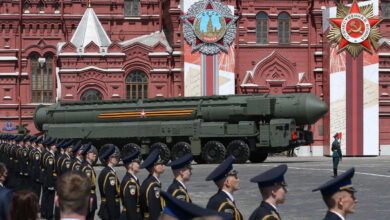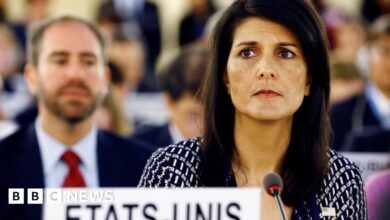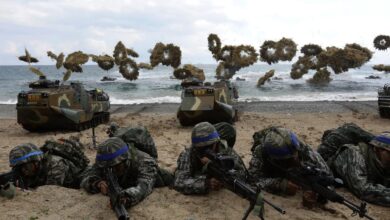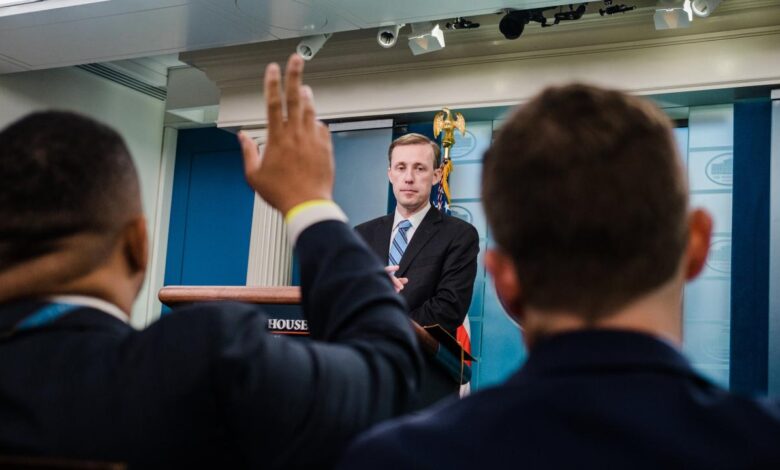
US Halts Nuclear Arsenal Information Exchange with Russia
US Halts Nuclear Arsenal Information Exchange with Russia, a move that has sent shockwaves through the international community. This decision, announced by the US government, marks a significant shift in the decades-long cooperation between the two nuclear superpowers. The implications of this halt are far-reaching, potentially impacting global nuclear stability and the delicate balance of power.
The decision to suspend information exchange stems from a complex web of geopolitical tensions and events. The US government has cited a number of factors, including concerns over Russia’s military actions and its overall stance on nuclear arms control.
The suspension of this vital communication channel raises serious questions about the future of nuclear cooperation between the US and Russia, leaving many to wonder about the potential consequences for global security.
Background of US-Russia Nuclear Cooperation
The history of US-Russia nuclear cooperation is marked by a complex interplay of competition, collaboration, and mistrust. Despite the Cold War rivalry, the two superpowers recognized the shared threat posed by nuclear weapons and the need for arms control and stability.
Key Agreements and Treaties
The exchange of nuclear information between the US and Russia has been formalized through a series of landmark agreements and treaties. These agreements established a framework for cooperation, aimed at reducing the risk of nuclear war and promoting transparency.
- Strategic Arms Limitation Talks (SALT I and II):These treaties, signed in the 1970s, were the first major agreements to limit the number of strategic nuclear weapons deployed by the US and the Soviet Union. They also established a framework for the exchange of information on nuclear weapons and testing.
- Intermediate-Range Nuclear Forces (INF) Treaty:Signed in 1987, this treaty eliminated all land-based intermediate-range nuclear missiles from the US and Soviet arsenals. It also included provisions for verification and information exchange.
- START I and II (Strategic Arms Reduction Treaties):These treaties, signed in the 1990s, further reduced the number of strategic nuclear weapons deployed by the US and Russia. They also included provisions for on-site inspections and information exchange.
- New START Treaty:Signed in 2010, this treaty extended the framework of START I and II, limiting the number of strategic nuclear warheads and deployed delivery vehicles. It also included provisions for transparency and information exchange.
Purpose and Objectives
The exchange of nuclear information between the US and Russia serves several key purposes:
- Risk Reduction:Sharing information on nuclear capabilities, doctrine, and command and control structures helps to reduce the risk of accidental or unintended nuclear war.
- Arms Control and Verification:The exchange of information is essential for verifying compliance with arms control agreements and ensuring that both sides are adhering to their commitments.
- Transparency and Confidence Building:Sharing information can build trust and transparency between the two nuclear powers, contributing to a more stable and predictable security environment.
Reasons for Halting Information Exchange
The decision to halt the US-Russia nuclear information exchange, a cornerstone of nuclear arms control for decades, was not made lightly. It was a direct consequence of the deteriorating state of US-Russia relations, driven by a confluence of events and escalating tensions.
The Rationale for Suspension
The US government cited several factors in its decision to suspend the exchange. The primary concern was the ongoing war in Ukraine, which has significantly strained US-Russia relations. The US viewed Russia’s actions in Ukraine as a violation of international law and a threat to global security.
The US halting nuclear arsenal information exchange with Russia is a serious escalation, reflecting the growing tensions between the two superpowers. Amidst this escalating situation, the news of a Chinese spy balloon shot down falling toward the Atlantic adds another layer of complexity to the already strained international relations.
This incident further underscores the need for clear communication and diplomatic solutions to prevent further escalation and potential conflict.
The US also expressed concerns about Russia’s lack of transparency regarding its nuclear arsenal and its unwillingness to engage in meaningful dialogue on nuclear arms control. This lack of transparency raised doubts about Russia’s commitment to the agreements that underpinned the information exchange.
Furthermore, the US cited Russia’s aggressive rhetoric and military posturing as further reasons for suspending the exchange. The US saw these actions as escalatory and destabilizing, raising fears of an unintended nuclear conflict. In essence, the US government deemed the continued exchange of nuclear information to be counterproductive in the current climate, arguing that it would be unwise to provide Russia with sensitive information while it was engaged in a conflict that threatened international peace and security.
Potential Implications for Nuclear Stability
The suspension of the US-Russia nuclear information exchange has significant implications for nuclear stability. The exchange was crucial for maintaining transparency and reducing the risk of miscalculation or unintended escalation. Its suspension raises concerns about the potential for increased uncertainty and mistrust between the two nuclear superpowers.
The news about the US halting nuclear arsenal information exchange with Russia is certainly a concerning development, especially given the current global climate. It’s a reminder that even as we see financial institutions like Credit Suisse tumble to record lows due to economic uncertainties, the potential for global conflict remains a very real threat.
This decision by the US only adds another layer of tension to an already complex geopolitical landscape.
Without the exchange, it becomes more difficult to monitor each other’s nuclear activities, leading to increased speculation and the potential for misinterpretation. This lack of transparency could exacerbate tensions and increase the risk of an accidental or deliberate nuclear conflict.The decision also sends a signal that the US is no longer willing to engage in nuclear arms control with Russia, potentially undermining efforts to reduce the global nuclear threat.
It could also embolden other countries to pursue their own nuclear weapons programs, leading to a more unstable and dangerous world.
Impact on Nuclear Arms Control
The US halting information exchange with Russia on nuclear arsenals has significant implications for existing and future arms control agreements. This action raises concerns about the future of nuclear non-proliferation efforts and the potential for increased nuclear tensions.
Impact on Existing Agreements, Us halts nuclear arsenal information exchange with russia
The suspension of information exchange could impact the implementation of existing arms control agreements, such as the New START treaty. This treaty, which entered into force in 2011, limits the number of strategic nuclear warheads and delivery systems that the US and Russia can deploy.
The information exchange was crucial for verifying compliance with the treaty.
- The US and Russia have long relied on this exchange to monitor each other’s nuclear arsenals and ensure compliance with the treaty.
- The suspension of this exchange could make it more difficult to verify compliance, potentially leading to increased mistrust and uncertainty.
- Without this information, it becomes more challenging to assess the true nature of each country’s nuclear capabilities and intentions.
Implications for Future Negotiations
The suspension of information exchange also raises concerns about the future of nuclear arms control negotiations.
- The US and Russia have been engaged in discussions about extending the New START treaty beyond its expiration date in 2026.
- However, the current climate of mistrust and the lack of communication could make it difficult to reach a new agreement.
- The US and Russia may find it challenging to build the necessary trust and cooperation to negotiate new arms control measures.
Risks of Increased Nuclear Tensions
The suspension of information exchange could contribute to increased nuclear tensions and mistrust between the US and Russia.
- The lack of transparency and communication could lead to misinterpretations and miscalculations, increasing the risk of accidental escalation.
- This could also lead to a renewed arms race, as both countries seek to enhance their nuclear capabilities in the absence of verifiable information about the other’s arsenal.
- This could also lead to a renewed arms race, as both countries seek to enhance their nuclear capabilities in the absence of verifiable information about the other’s arsenal.
International Reactions and Perspectives
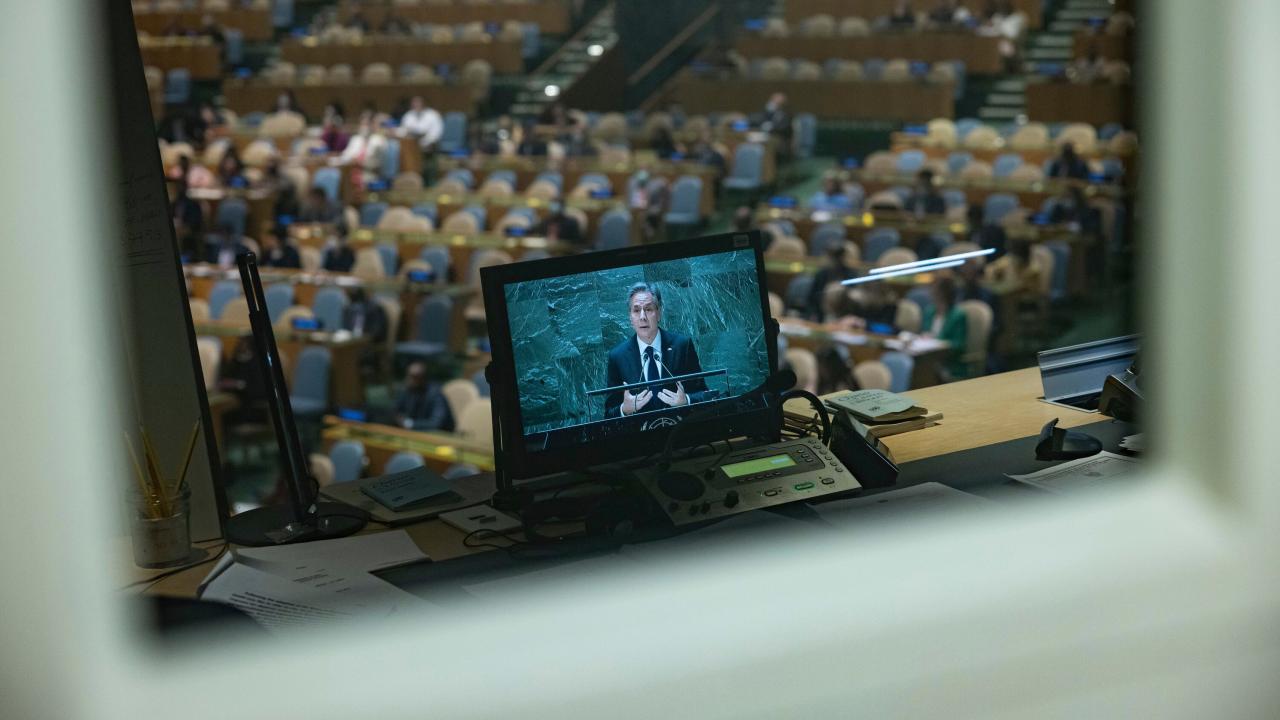
The US decision to halt nuclear arsenal information exchange with Russia has sparked a wave of reactions from the international community, with varying levels of concern and support. Many countries express apprehension about the potential implications for nuclear arms control and global security.
Reactions of Other Countries
The decision has been met with a mix of concern and cautious optimism from other countries. Several nations have expressed worry about the potential for escalation and instability, while others have voiced support for the US position, emphasizing the need for Russia to be held accountable for its actions.
- NATO Allies:NATO allies have largely supported the US decision, highlighting the importance of holding Russia accountable for its actions in Ukraine. They emphasize the need for Russia to return to the negotiating table and engage in meaningful dialogue on nuclear arms control.
- European Union:The EU has expressed concern about the potential impact on nuclear arms control, but has also stressed the need for Russia to address its behavior. The EU has called for Russia to return to the negotiating table and engage in good faith with the international community.
- China:China has expressed concern about the potential for escalation and has called for all parties to exercise restraint and avoid actions that could lead to conflict. China has also called for a return to dialogue and negotiations to address the nuclear arms control challenges.
- India:India has expressed concern about the potential for instability and has called for a return to dialogue and negotiations. India has also emphasized the need for all countries to uphold the principles of nuclear non-proliferation and disarmament.
Different Perspectives on the Implications
The implications of the US decision to halt information exchange with Russia are being debated widely, with different perspectives emerging from various stakeholders.
The news of the US halting nuclear arsenal information exchange with Russia is understandably unsettling. It’s a reminder of the precariousness of our world and can easily trigger anxiety. If you’re feeling stressed, consider trying some natural ways to relieve tension, like those outlined in this article on psychologist 4 natural ways to relieve tension and anxiety.
Taking care of your mental health is crucial, especially during times of global uncertainty.
- Arms Control Experts:Many arms control experts express concern that the decision could lead to a breakdown in communication and trust between the US and Russia, potentially jeopardizing existing arms control agreements and increasing the risk of accidental or intentional nuclear conflict.
- Security Analysts:Some security analysts argue that the decision is a necessary step to deter Russia’s aggressive behavior and force it to take nuclear arms control more seriously. They believe that Russia’s actions in Ukraine have demonstrated a disregard for international norms and a willingness to use nuclear threats as a tool of foreign policy.
- Diplomats:Diplomats from various countries have expressed concern about the potential for escalation and instability. They argue that the decision could lead to a cycle of mistrust and hostility, making it more difficult to achieve meaningful progress on nuclear arms control.
Potential for International Cooperation in Nuclear Arms Control
Despite the challenges, there is still potential for international cooperation in nuclear arms control. The US and Russia, despite their current tensions, have a shared interest in preventing a nuclear catastrophe.
- New START Treaty:The New START Treaty, which limits the number of strategic nuclear warheads and delivery vehicles for both countries, is still in force. It is a crucial framework for nuclear arms control, and its extension is a testament to the shared interest in stability.
- Dialogue and Negotiations:Despite the current impasse, dialogue and negotiations remain essential for building trust and addressing the challenges of nuclear arms control.
- International Organizations:International organizations like the United Nations and the International Atomic Energy Agency can play a crucial role in fostering dialogue and promoting international cooperation on nuclear arms control.
Future of US-Russia Nuclear Relations

The US halting nuclear arsenal information exchange with Russia marks a significant turning point in their relationship. This decision carries profound implications for the future of nuclear arms control and global security.
Potential Long-Term Consequences
The decision to halt information exchange could have several long-term consequences.
- Increased Mistrust and Miscalculation:The lack of communication and transparency can lead to increased mistrust and miscalculation, raising the risk of accidental escalation or unintended conflict.
- Erosion of Arms Control Regimes:This decision could undermine existing arms control agreements, making it harder to achieve future agreements and potentially leading to a new arms race.
- Impact on Strategic Stability:The lack of information exchange could disrupt strategic stability, making it more difficult for both sides to assess each other’s capabilities and intentions.
- Challenges for International Security:This situation could have a broader impact on international security, creating a more uncertain and potentially unstable environment.
Challenges and Opportunities for Restoring Communication
Restoring communication and trust between the US and Russia will be a challenging but crucial step towards restoring stability in nuclear relations.
- Addressing Underlying Issues:Restoring communication requires addressing the underlying issues that led to the breakdown in trust, such as the ongoing conflict in Ukraine and broader geopolitical tensions.
- Building Confidence-Building Measures:Implementing confidence-building measures, such as resuming limited information exchange or joint exercises, could help rebuild trust and facilitate dialogue.
- Finding Common Ground:Identifying areas of common interest, such as preventing nuclear proliferation or reducing the risk of accidental nuclear war, can provide a foundation for dialogue and cooperation.
- Engaging Third Parties:Engaging third parties, such as international organizations or other nuclear-armed states, could help facilitate dialogue and mediation.
Potential Pathways for Resuming Nuclear Information Exchange
Resuming nuclear information exchange will require a step-by-step approach, starting with small, incremental steps.
- Pilot Programs:Initiating pilot programs for limited information exchange on specific topics could help build trust and demonstrate the benefits of cooperation.
- Technical Exchanges:Resuming technical exchanges on specific aspects of nuclear weapons, such as safety and security, could be a starting point for broader communication.
- Joint Working Groups:Establishing joint working groups on specific nuclear issues, such as the reduction of nuclear risks, could provide a platform for dialogue and cooperation.
- Negotiating New Agreements:Exploring the possibility of negotiating new agreements, such as a new START treaty, could create a framework for renewed cooperation and information exchange.
Wrap-Up: Us Halts Nuclear Arsenal Information Exchange With Russia
The decision to halt nuclear information exchange with Russia is a stark reminder of the fragile state of global nuclear security. It underscores the need for open communication and continued dialogue, even in the face of escalating tensions. The international community must work together to find a way to restore trust and cooperation, ensuring that the threat of nuclear war remains a distant possibility.
The future of nuclear arms control hangs in the balance, and the consequences of this decision will be felt for years to come.

